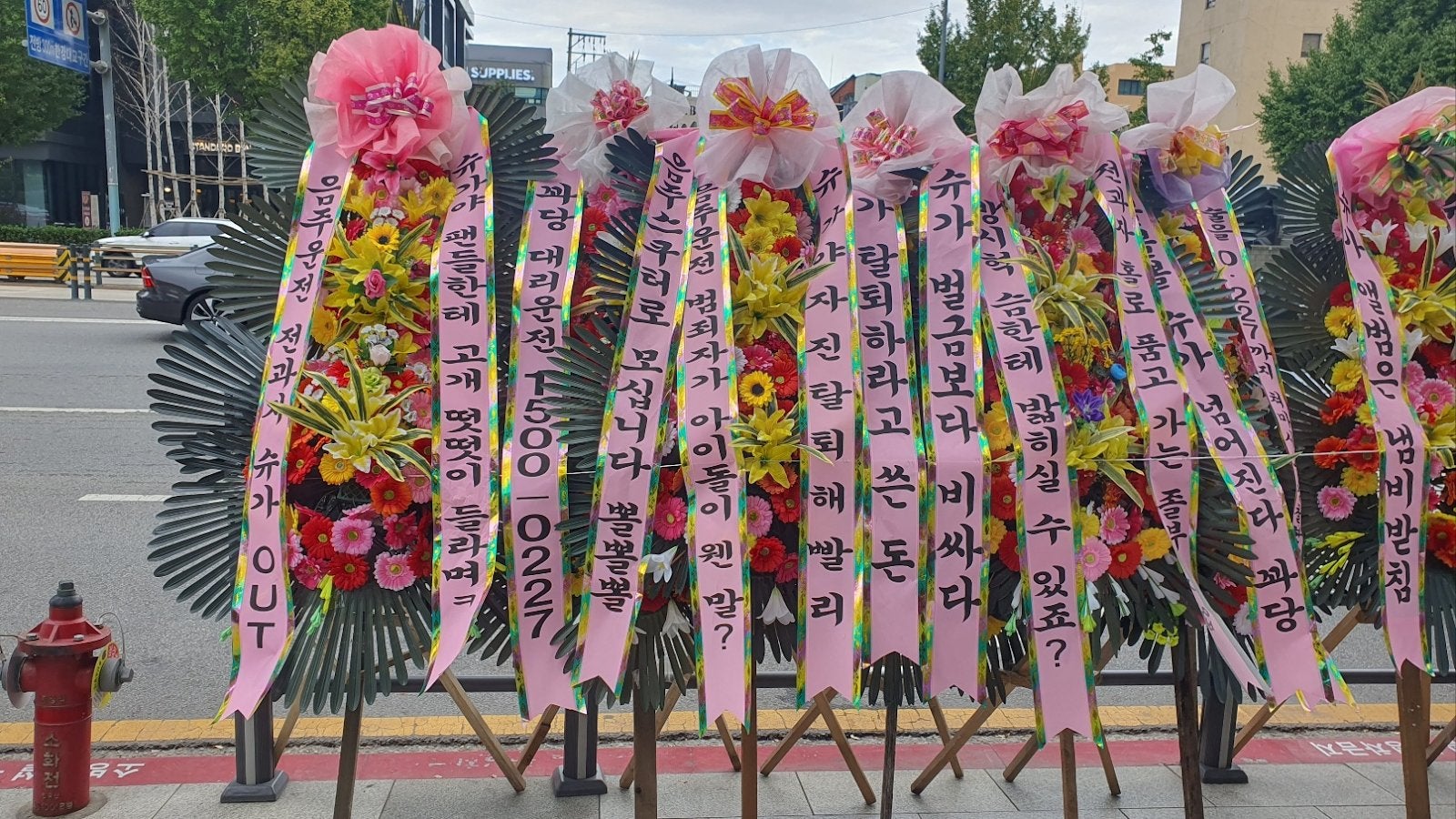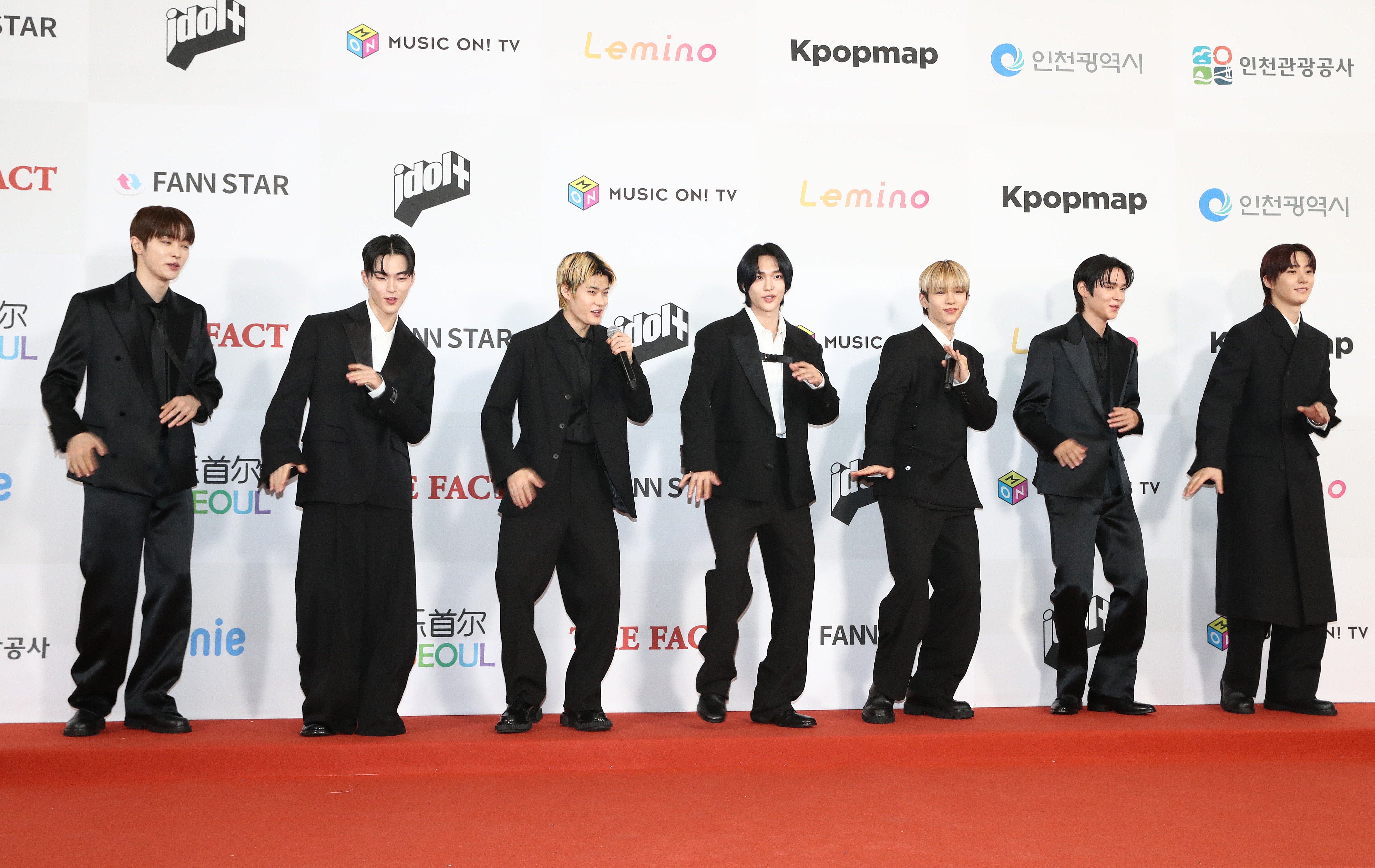How £55 funeral wreaths sent by disgruntled K-pop fans became a public menace
Once a solemn symbol of mourning, funeral wreaths have taken on a new role in South Korea as a tool of protest, Shahana Yasmin reports

Your support helps us to tell the story
From reproductive rights to climate change to Big Tech, The Independent is on the ground when the story is developing. Whether it's investigating the financials of Elon Musk's pro-Trump PAC or producing our latest documentary, 'The A Word', which shines a light on the American women fighting for reproductive rights, we know how important it is to parse out the facts from the messaging.
At such a critical moment in US history, we need reporters on the ground. Your donation allows us to keep sending journalists to speak to both sides of the story.
The Independent is trusted by Americans across the entire political spectrum. And unlike many other quality news outlets, we choose not to lock Americans out of our reporting and analysis with paywalls. We believe quality journalism should be available to everyone, paid for by those who can afford it.
Your support makes all the difference.Earlier this year, one of South Korea’s biggest entertainment companies, SM Entertainment, found the plaza outside their headquarters in Seoul filled with hundreds of funeral wreaths. Sent by fans of one of the K-pop groups the company manages, the floral tributes lined the street not in mourning, but as a form of protest at the return of a boy band member they deemed controversial.
Once a solemn symbol of mourning, funeral wreaths have taken on a new role in South Korea—as a symbol of protest.
Korean media reports suggest funeral wreaths started being used as a form of protest first in 2006, after residents who opposed the development of a lake park in South Chungcheong Province sent them to local government offices. Similar protests in 2021 over the death of 16-month-old Jung-in, who was fatally abused by her adoptive parents, brought widespread attention to the systemic negligence in South Korea’s adoption process, prompting national outrage and demands for reform.
However, what began as a form of protest aimed at holding government institutions and public servants accountable has now devolved into a tool for K-pop fans to target young artists for personal choices, turning what was once a means of demanding justice into a weapon for enforcing toxic fandom standards and engaging in public shaming.
RIIZE, a boy band managed by SM Entertainment, was embroiled in controversy after private photos of member Seunghan which showed him kissing an unidentified woman in a bed and smoking a cigarette were leaked in August 2023. Seunghan was put on an indefinite hiatus following outrage by some fans at what they considered inappropriate behaviour for a K-pop idol.

In October this year, SM Entertainment’s announcement that Seunghan would be returning to the band was met with disapproval by fans, who chose to flood the company’s headquarters with funeral wreaths carrying messages for the 21-year-old to leave the group.
According to Korean media, over 1,000 funeral wreaths were sent, with messages reading, “Who Are You, Hong Seunghan?’ and “Seunghan, Leave”.
The often elaborate wreaths, which cost between $70 and $170 (£55 and £134), have become an increasingly common symbol of the extreme parasocial relationships between idols and fans that entertainment companies in South Korea heavily promote.
Shortly after the wreaths started to arrive, Park Jae-hyung, a former member of the South Korean rock band Day6, called them “attempted murder”, echoing many others who described the wreaths addressed to individuals as bullying.
“The funeral flowers were disgusting. The same people who sent them will be the first ones online mourning the tragic outcome they fought for. God forbid tragedy occurs but I’ve been on that side before and It was close. I can’t imagine the trauma it would cause someone that young,” he posted.
“Anyone involved in the flowers should be tried for attempted murder because that is what that was.”
Hybe, the multinational entertainment company that manages some of the biggest bands in Korea, including BTS, Seventeen, New Jeans, and Le Sserafim, saw funeral wreaths several times in 2024.
First, in May, when fans sent them to protest what they saw as inaction by the company over “baseless allegations and defamation against BTS”. In October, when BTS member Suga had his licence revoked after he was found riding an electric scooter back home while intoxicated, fans sent in wreaths with his name to the company demanding that he be removed from the band.
Kim Seung Jin, who has lived in the area near the SM headquarters for over 20 years, described the wreaths and protests as a public nuisance.
“At first, the SM building brought a nice vibe, but lately it feels like there’s a protest whenever something goes wrong. Trucks with signs demanding idols to leave or return are a regular sight,“ he said.
Another resident, Lee Jung-Eun, said seeing the wreaths was unsettling. “I understand fans are upset, but seeing these wreaths at night can be eerie. It feels like they’re starting to affect the entire neighborhood’s appearance.”
South Korean police have begun to treat the wreaths as symbolic expressions of outrage, routinely classifying them as public civil protests. In some cases, authorities are allowed to and even expected to ensure these displays are protected, since they are considered a legal form of protest under South Korea’s public demonstration laws.
Citizens are allowed to send in funeral wreaths as long as they submit an application 48 hours in advance and list the items being used in the protest as well as how many there will be.
“Funeral wreaths are now considered protest materials, so the number intended for use must be declared in advance,” a police official told The Korea Times.
However, there is now growing concern that the wreaths are crossing ethical lines, especially when they carry messages aimed at individuals instead of entities like government institutions or corporations.
Some experts have argued that if wreaths constitute targeted personal attacks, or even perceived death threats, they may breach defamation, harassment, or intimidation laws under South Korea’s Criminal Act.
Enforcing penalties for unauthorised funeral wreath protests is challenging due to a combination of legal and logistical hurdles. A significant issue is the difficulty of tracing the buyers of the wreaths, since they are often delivered by third-party vendors, making it nearly impossible to identify the individuals or groups responsible. A Seongdong District Office official noted that only delivery personnel are visible during these protests, limiting corrective police action.
Police say that unlike dangerous objects that pose immediate threats to public safety, wreaths do not warrant swift removal on these grounds.
Moreover, the legal status of the wreaths complicates matters. Even when they obstruct public spaces, wreaths are considered private property, preventing authorities from easily removing them without risking legal disputes.
Join our commenting forum
Join thought-provoking conversations, follow other Independent readers and see their replies
Comments